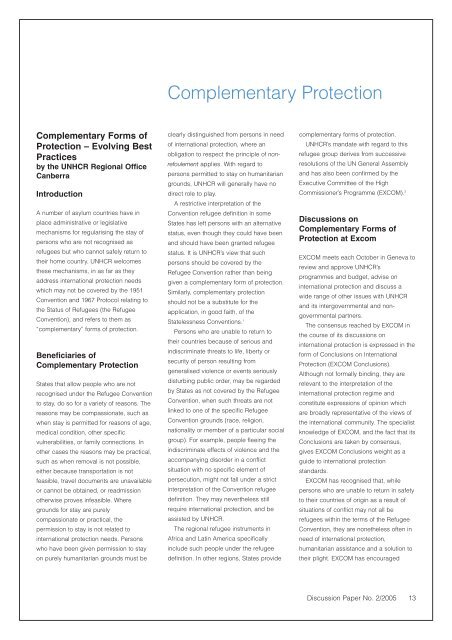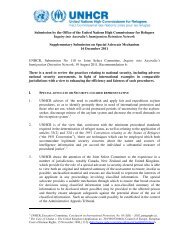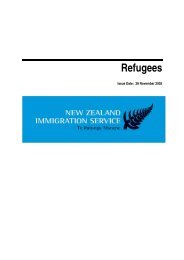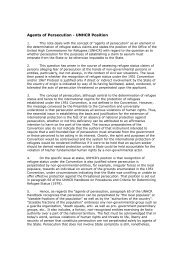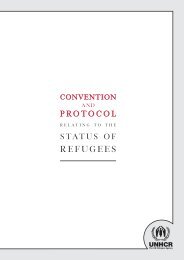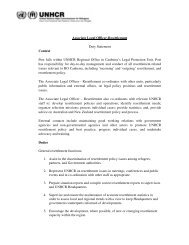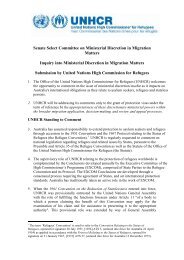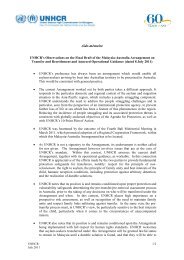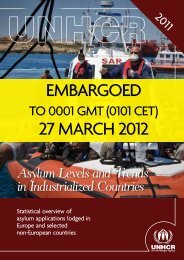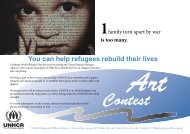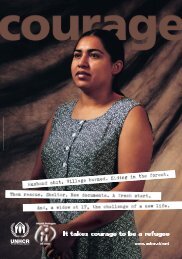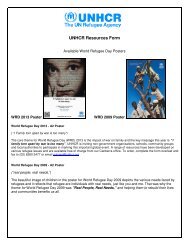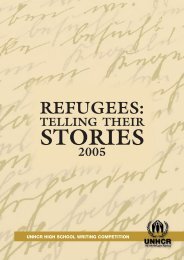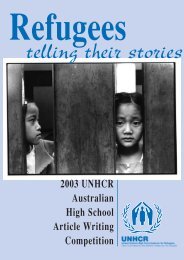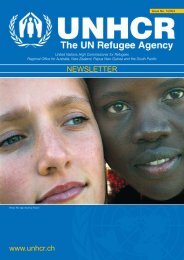Refugee Newsletter - unhcr
Refugee Newsletter - unhcr
Refugee Newsletter - unhcr
Create successful ePaper yourself
Turn your PDF publications into a flip-book with our unique Google optimized e-Paper software.
Complementary ProtectionComplementary Forms ofProtection – Evolving BestPracticesby the UNHCR Regional OfficeCanberraIntroductionA number of asylum countries have inplace administrative or legislativemechanisms for regularising the stay ofpersons who are not recognised asrefugees but who cannot safely return totheir home country. UNHCR welcomesthese mechanisms, in as far as theyaddress international protection needswhich may not be covered by the 1951Convention and 1967 Protocol relating tothe Status of <strong>Refugee</strong>s (the <strong>Refugee</strong>Convention), and refers to them as“complementary” forms of protection.Beneficiaries ofComplementary ProtectionStates that allow people who are notrecognised under the <strong>Refugee</strong> Conventionto stay, do so for a variety of reasons. Thereasons may be compassionate, such aswhen stay is permitted for reasons of age,medical condition, other specificvulnerabilities, or family connections. Inother cases the reasons may be practical,such as when removal is not possible,either because transportation is notfeasible, travel documents are unavailableor cannot be obtained, or readmissionotherwise proves infeasible. Wheregrounds for stay are purelycompassionate or practical, thepermission to stay is not related tointernational protection needs. Personswho have been given permission to stayon purely humanitarian grounds must beclearly distinguished from persons in needof international protection, where anobligation to respect the principle of nonrefoulementapplies. With regard topersons permitted to stay on humanitariangrounds, UNHCR will generally have nodirect role to play.A restrictive interpretation of theConvention refugee definition in someStates has left persons with an alternativestatus, even though they could have beenand should have been granted refugeestatus. It is UNHCR’s view that suchpersons should be covered by the<strong>Refugee</strong> Convention rather than beinggiven a complementary form of protection.Similarly, complementary protectionshould not be a substitute for theapplication, in good faith, of theStatelessness Conventions. 1Persons who are unable to return totheir countries because of serious andindiscriminate threats to life, liberty orsecurity of person resulting fromgeneralised violence or events seriouslydisturbing public order, may be regardedby States as not covered by the <strong>Refugee</strong>Convention, when such threats are notlinked to one of the specific <strong>Refugee</strong>Convention grounds (race, religion,nationality or member of a particular socialgroup). For example, people fleeing theindiscriminate effects of violence and theaccompanying disorder in a conflictsituation with no specific element ofpersecution, might not fall under a strictinterpretation of the Convention refugeedefinition. They may nevertheless stillrequire international protection, and beassisted by UNHCR.The regional refugee instruments inAfrica and Latin America specificallyinclude such people under the refugeedefinition. In other regions, States providecomplementary forms of protection.UNHCR’s mandate with regard to thisrefugee group derives from successiveresolutions of the UN General Assemblyand has also been confirmed by theExecutive Committee of the HighCommissioner’s Programme (EXCOM). 2Discussions onComplementary Forms ofProtection at ExcomEXCOM meets each October in Geneva toreview and approve UNHCR’sprogrammes and budget, advise oninternational protection and discuss awide range of other issues with UNHCRand its intergovernmental and nongovernmentalpartners.The consensus reached by EXCOM inthe course of its discussions oninternational protection is expressed in theform of Conclusions on InternationalProtection (EXCOM Conclusions).Although not formally binding, they arerelevant to the interpretation of theinternational protection regime andconstitute expressions of opinion whichare broadly representative of the views ofthe international community. The specialistknowledge of EXCOM, and the fact that itsConclusions are taken by consensus,gives EXCOM Conclusions weight as aguide to international protectionstandards.EXCOM has recognised that, whilepersons who are unable to return in safetyto their countries of origin as a result ofsituations of conflict may not all berefugees within the terms of the <strong>Refugee</strong>Convention, they are nonetheless often inneed of international protection,humanitarian assistance and a solution totheir plight. EXCOM has encouragedDiscussion Paper No. 2/200513


